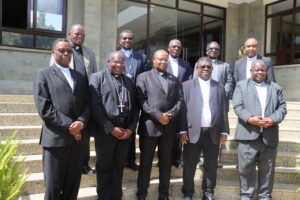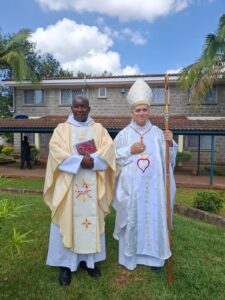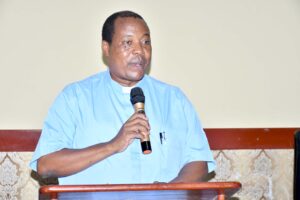SECAM: Catholic Church in Africa Affirms Attachment to Successor of Peter But Will Not Bless Homosexual Unions

Sr. Jecinter Antoinette Okoth, FSSA
In response to the Vatican’s document “Fiducia Supplicans” (The supplicating trust) that was released on Monday, December 18, the Bishops in Africa have declared their stand and maintained their position that as a continent, the extra-liturgical blessings proposed in the Declaration concerning same-sex couples, “cannot be carried out in Africa.”
“We, the African Bishops, do not consider it appropriate for Africa to bless homosexual unions or same-sex couples because, in our context, this would cause confusion and would be in direct contradiction to the cultural ethos of African communities,” reads the statement from the leadership of the Symposium of Episcopal Conference of Africa and Madagascar (SECAM) shared with AMECEA Online Thursday, January 11.
The pronouncement from the whole Church in Africa according to the statement, “has received the agreement of His Holiness Pope Francis and His Eminence Cardinal Victor Manuel Fernåndez, Prefect of the Dicastery for the Doctrine of the Faith.” At the same time the Prelates “Reaffirms their unwavering attachment to the Successor of Peter, their communion with him and their fidelity to the Gospel.”
The consolidated summary of the positions adopted by various National and Inter-territorial Episcopal Conferences across the African continent comes following SECAM’s request to all the Presidents of National Episcopal Conferences in Africa to share their opinion on the Vatican’s document that has “caused a shockwave, sown misconceptions, and unrest in the minds of many lay faithful, consecrated persons, and even pastors and has aroused strong reactions” since its publication.
According to the Bishops in Africa in their message signed by SECAM’s President Fridolin Cardinal Ambongo Besungu of Kinshasa Archdiocese in the Democratic Republic of the Congo (DRC), their decision not to bless same-sex couples “stems from concern about potential confusion and scandal within the Church community.”
“The constant teaching of the Church describes homosexual acts as “intrinsically disordered” (Congregation for the Doctrine of the Faith, Declaration Persona Humana, n. 8) and contrary to the natural law,” reads part of the Thursday statement as it continues in reference to what the Catholic Church teaches, “These acts, considered as closing the sexual act to the gift of life and not proceeding from a genuine affective and sexual complementarity, must not be approved under any circumstances” (Catechism of the Catholic Church, n. 2357).
Amidst the indistinctness of the Vatican’s document, the Church in Africa acknowledges the Fiducia supplicans’ view on the traditional position of the Church concerning the unchanged doctrine of marriage and sexuality.
“This position, rooted in the Sacred Scriptures, has been taught without interruption by the universal Magisterium of the Church. Therefore, rites and prayers that could blur the definition of marriage as an exclusive, stable, and indissoluble union between a man and a woman, open to procreation are considered unacceptable,” the bishops said in their statement.
The Church leaders also appreciate the clarification by the Dicastery of Doctrine of Faith which explains that blessings of same-sex couples, “should be carried out outside liturgical frameworks,” the distinction made between “liturgical blessings or formal ritual blessings and spontaneous blessings is not intended to mandate that there be blessings for couples in irregular situations and same-sex couples (cf. 3 1).
The African Church as a family of God therefore “reaffirms its commitment to continuing pastoral assistance to all its members and encourages the clergy “to provide welcoming and supportive pastoral care, particularly to couples in irregular situations.”
The bishops emphasize that “people with a homosexual tendency must be treated with respect and dignity while reminding them that unions of persons of the same sex are contrary to the will of God and therefore cannot receive the blessing of the Church.”
The statement highlights that bishops’ disapproval of blessing same-sex couples finds its roots based on in Biblical passages and on the Word of God.
The Prelates cite passages that condemn homosexuality, “notably Leviticus 18:22-23 where homosexuality is explicitly prohibited and considered an abomination…. Again, in the narration on the scandal of the homosexuals of Sodom (cf. Gen 19, 4-11) “homosexuality is so abominable that it would lead to the destruction of the city.”
“In addition to these biblical reasons, the cultural context in Africa, deeply rooted in the values of the natural law regarding marriage and family, further complicates the acceptance of unions of persons of the same sex, as they are seen as contradictory to cultural norms and intrinsically corrupt,” reads the statement from the bishops in Africa as they justify further their stand.
The Catholic Church leaders in Africa and the Island also criticize the language used in the Fiducia supplicans declaration saying it “remains too subtle for simple people to understand.”
“Furthermore, it remains very difficult to be convinced that people of the same sex who live in a stable union do not claim the legitimacy of their own status,” hence the reason for the need to insist on the conversion of all.
Cardinal Ambogo on behalf of all the bishops in the African continent calls on “Christian communities not to allow themselves to be shaken,” but to know Pope Francis, “fiercely opposed to any form of cultural colonization in Africa and blesses the African people with all his heart and encourages them to remain faithful, as always, to the defense of Christian values.”


